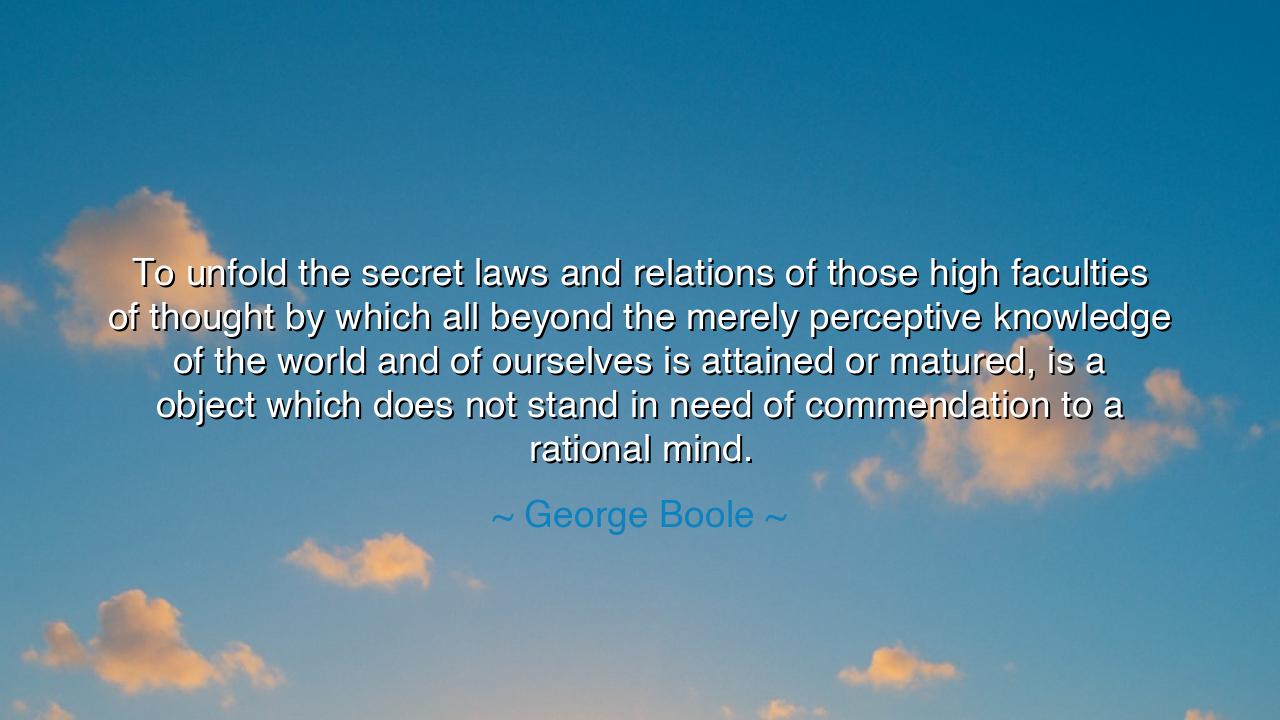
To unfold the secret laws and relations of those high faculties
To unfold the secret laws and relations of those high faculties of thought by which all beyond the merely perceptive knowledge of the world and of ourselves is attained or matured, is a object which does not stand in need of commendation to a rational mind.






Hear, O student of the mind, the profound words of George Boole, a man whose thoughts built the very foundations of logic in the age of machines: “To unfold the secret laws and relations of those high faculties of thought by which all beyond the merely perceptive knowledge of the world and of ourselves is attained or matured, is an object which does not stand in need of commendation to a rational mind.” These are not the casual musings of a scholar, but the solemn declaration of a seeker who sought to uncover the hidden architecture of human reason itself — the laws that govern not the stars above, but the cosmos within.
The meaning of this quote reaches into the heart of human understanding. Boole speaks of the high faculties of thought — the powers of reasoning, abstraction, and reflection that elevate humanity beyond mere perception. For perception alone sees the world; but thought interprets it, transforms it, and gives it meaning. To study these faculties — to “unfold their secret laws” — is to attempt to understand the very mechanism of intelligence. Boole is saying that such a pursuit needs no defense, no persuasion, for any truly rational mind already recognizes that to know how we think is to know how we become more fully human. It is the noblest inquiry of all — the exploration of the light by which all other lights are seen.
The origin of these words lies in Boole’s lifelong quest to formalize human thought through mathematics. In the 19th century, as others charted new worlds through industry and invention, Boole turned inward, into the mysterious realm of logic. In his work An Investigation of the Laws of Thought (1854), he sought to reveal that even the processes of reasoning — of truth and falsehood, affirmation and denial — could be expressed in symbols and governed by universal laws. This daring endeavor gave birth to what we now call Boolean logic, the foundation of digital computation, the very language upon which the modern world of technology is built. Yet behind this work was not mere calculation — it was a philosophical conviction: that reason itself is divine, and that uncovering its structure is an act of reverence toward truth.
To understand the spirit of his words, imagine the ancient philosopher Aristotle, who first tried to describe the syllogisms that govern reasoning: “If all men are mortal, and Socrates is a man, then Socrates is mortal.” Boole stood centuries later where Aristotle had once stood, gazing into the same mystery — but he sought to go further. Where Aristotle had used words, Boole used numbers; where the ancients spoke in argument, he spoke in algebra. He took the eternal laws of thought and gave them form — a bridge between philosophy and mathematics. In doing so, he joined the ranks of those who sought not to exploit nature, but to understand it through understanding themselves.
The ancients would have admired his purpose, for they too revered the exploration of the mind as a sacred calling. Plato spoke of the intellect as a charioteer guiding the soul, striving toward truth; Descartes, centuries later, declared, “I think, therefore I am.” Boole continues this lineage — he teaches that to study how we think is not arrogance, but duty. For without such inquiry, humanity becomes a prisoner of its own instincts, living by reaction instead of reflection. Knowledge of thought is the liberation of thought; it is the key to all higher understanding, the force that transforms perception into wisdom.
In the quiet rhythm of Boole’s words there is also humility. He calls the rational mind to seek not fame, but understanding. The “object” he describes — the study of human reason — is not to be justified by profit, pleasure, or prestige, but by its inherent worth. To a truly rational being, he says, the value of truth is self-evident. Just as light reveals itself without needing to prove its brightness, so too does the pursuit of understanding require no commendation. This is a reminder to every thinker, scholar, and dreamer: that the noblest work is often the least adorned, and the purest motivation is the quiet longing to know.
Let us look to our own age, where machines now “think” in the language Boole conceived. Every search, every circuit, every spark of artificial intelligence carries within it the ghost of his question: What are the laws of thought? Yet in this irony lies our task — to ensure that, while our machines grow clever, our humanity grows wise. To study the workings of our mind is not to diminish mystery, but to deepen it; for the more we understand of reason, the more we glimpse the vastness of what lies beyond it.
Thus, the lesson of George Boole endures: seek to understand the mind, for in doing so, you understand creation itself. Do not be content with perception — go beyond it. Question not only what you see, but how you see. For in the study of your own thoughts lies the key to every other knowledge — the map of truth, drawn not in ink or stone, but in the eternal geometry of reason. And when you unfold the secret laws of your own mind, you participate in the divine act of creation — you become, as Boole himself was, a builder of understanding, a revealer of the hidden harmonies of thought that bind the universe together.






AAdministratorAdministrator
Welcome, honored guests. Please leave a comment, we will respond soon